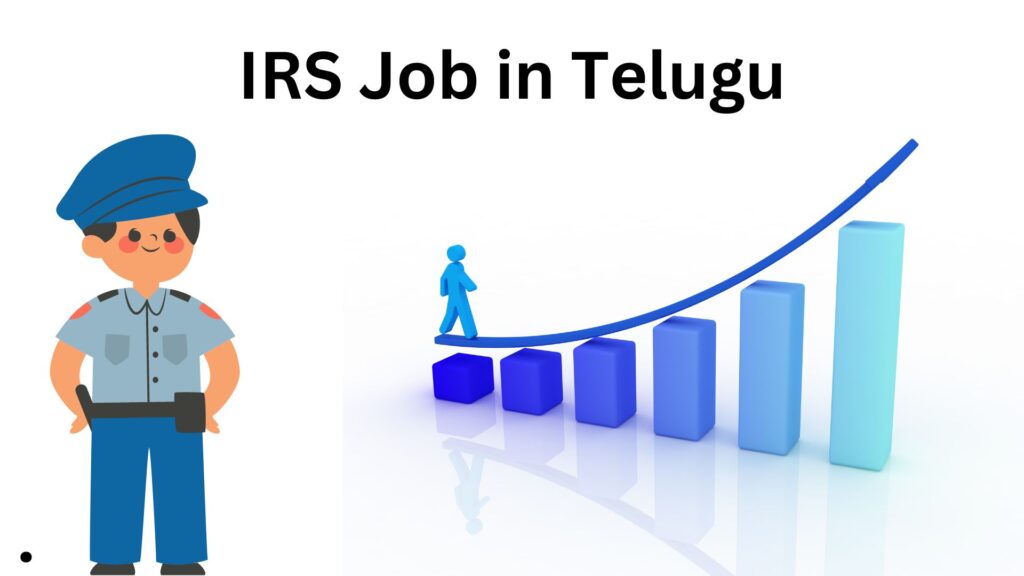How to Get an IRS Job in Telugu 2024: Eligibility, Salary, Allowances, Benefits, Post Names, Duties, and Syllabus
హాయ్ ఫ్రెండ్స్ ఎలా ఉన్నారు. ఇప్పుడు మనం IRS ఆఫీసర్ ఎలా అవ్వాలి అనేది తెలుసుకుందాం, మిలో చాలామందికి IAS | IPS కావాలి అనుకుంటారు, ఎక్కువ ప్రాధాన్యత వాటికే ఇస్తారు అలాగే మనం UPSC BOARD కూడా మనకు వచ్చిన ర్యాంక్ బట్టి ఉద్యోగం ఇస్తుంది, IRS ఉద్యోగం కూడా చాల బాగుంటుంది, కస్టమ్స్ , టాక్స్, IT ఇలా ఈ సంస్థల్లో మనం ఉద్యోగం చేయడం ఉంటుంది. ఇప్పుడు మనం eligibility, salary, allowances, benefits, post names, duties, and syllabus వీటి గురించి తెలుసుకుందాం.
Eligibility For IRS
- Indian Citizen: ఇండియన్ సిటిజెన్ అయినవారు మాత్రమే దీనికి అప్లై చేయాలి.
- Minimum Qualification: గుర్తింపు ఉన్న యూనివర్సిటీ నుండి డిగ్రీ సర్టిఫికెట్ ఉండాలి .
- Final Year Students: డిగ్రీ ఫైనల్ ఇయర్ వాళ్ళు కూడా అప్లై చేయవచ్చు.
- Age Limit:
వయస్సు 21yrs నుండి 32 yrs వరకు ఉంటుంది.
OBC: 3 years
SC/ST: 5 years
Disabled Defense Services personnel: 3 years
Ex-servicemen: 5 years
Persons with Benchmark Disabilities (PwBD): 10 years
Number of Attempts
- General Category: 6 attempts
- OBC Category: 9 attempts
- SC/ST Category: Unlimited attempts until the age limit is reached
- Persons with Benchmark Disability: 9 attempts for general and OBC, unlimited for SC/ST.
Salary
The salary structure of an IRS officer is quite attractive and comes with various perks and benefits. The pay scale for IRS officers is as follows:
- Pay Band:
The initial pay band for an IRS officer is Rs. 15,600 – 39,100. - Grade Pay:
The grade pay for an entry-level IRS officer is Rs. 5,400. - Basic Pay:
The basic pay for an entry-level IRS officer is approximately Rs. 56,100 per month. - Total Salary:
Including all allowances, the initial salary of an IRS officer is around Rs. 70,000 to 85,000 per month.

Allowances and Benefits
An IRS officer is entitled to various allowances and benefits, which make the job even more lucrative. Here are some of the key allowances and benefits:
- Dearness Allowance (DA):
This is a cost of living adjustment allowance and is revised twice a year. - House Rent Allowance (HRA):
This allowance is provided if the officer does not avail of the government accommodation. - Transport Allowance:
This allowance is provided for commuting between the residence and office. - Medical Allowance:
IRS officers receive comprehensive medical benefits for themselves and their dependents. - Pension and Retirement Benefits:
IRS officers are entitled to pension benefits after retirement. - Other Benefits:
Free or subsidized accommodation, subsidized electricity and water supply, concessional loans for personal needs, and Leave Travel Concession (LTC).
Post Names and Duties
IRS officers are posted in various capacities throughout their careers. Here are some of the key posts and their associated duties:
- Assistant Commissioner of Income Tax (ACIT):
An entry-level position where the officer is responsible for assessment of income tax returns, enforcement of tax laws, and conducting tax audits. - Deputy Commissioner of Income Tax (DCIT):
Responsible for supervising the work of ACITs and handling more complex cases of tax evasion and fraud. - Joint Commissioner of Income Tax (JCIT):
In charge of a range of functions, including policy implementation and coordination among various units. - Additional Commissioner of Income Tax (Addl. CIT):
Oversees a large jurisdiction, ensuring the effective functioning of tax laws and administration. - Commissioner of Income Tax (CIT):
A senior position responsible for managing the entire range of tax-related activities in a large geographical area. - Principal Commissioner of Income Tax (Pr. CIT):
A higher rank responsible for strategic decision-making and policy implementation at a regional level. - Chief Commissioner of Income Tax (CCIT):
The highest rank, overseeing the entire tax administration of a zone comprising multiple regions.
IRS EXAM | SYLLABUS
Preliminary Examination (Prelims)
Paper I: General Studies (GS)
- Total Marks: 200
- Duration: 2 hours
- Syllabus:
- Current events of national and international importance
- History of India and Indian National Movement
- Indian and World Geography – Physical, Social, Economic Geography of India and the World
- Indian Polity and Governance – Constitution, Political System, Panchayati Raj, Public Policy, Rights Issues, etc.
- Economic and Social Development – Sustainable Development, Poverty, Inclusion, Demographics, Social Sector initiatives, etc.
- General issues on Environmental Ecology, Biodiversity, and Climate Change – that do not require subject specialization
- General Science
Paper II: Civil Services Aptitude Test (CSAT)
- Total Marks: 200
- Duration: 2 hours
- Syllabus:
- Comprehension
- Interpersonal skills including communication skills
- Logical reasoning and analytical ability
- Decision-making and problem-solving
- General mental ability
- Basic numeracy (numbers and their relations, orders of magnitude, etc.) (Class X level)
- Data interpretation (charts, graphs, tables, data sufficiency, etc.) (Class X level)
- Note: Paper II (CSAT) is of qualifying nature and the candidate must score at least 33% marks in it.
Main Examination (Mains)
Qualifying Papers
Paper A: Indian Language
- Total Marks: 300
- Duration: 3 hours
- Syllabus: Comprehension, precise writing, usage and vocabulary, short essay, translation from English to the Indian language and vice-versa.
Paper B: English
- Total Marks: 300
- Duration: 3 hours
- Syllabus: Comprehension, precise writing, usage and vocabulary, short essay.
Papers Counted for Merit
Paper I: Essay
- Total Marks: 250
- Duration: 3 hours
- Syllabus: Candidates may be required to write essays on multiple topics. They are expected to keep closely to the subject of the essay, arrange their ideas in an orderly fashion, and write concisely.
Paper II: General Studies I
- Total Marks: 250
- Duration: 3 hours
- Syllabus: Indian Heritage and Culture, History, and Geography of the World and Society.
Paper III: General Studies II
- Total Marks: 250
- Duration: 3 hours
- Syllabus: Governance, Constitution, Polity, Social Justice, and International relations.
Paper IV: General Studies III
- Total Marks: 250
- Duration: 3 hours
- Syllabus: Technology, Economic Development, Bio-diversity, Environment, Security, and Disaster Management.
Paper V: General Studies IV
- Total Marks: 250
- Duration: 3 hours
- Syllabus: Ethics, Integrity, and Aptitude. This paper includes questions to test the candidate’s attitude and approach to issues relating to integrity, probity in public life, and problem-solving approach to various issues and conflicts faced by him/her in dealing with society.
Paper VI & VII: Optional Subject Papers I & II
- Total Marks: 250 each
- Duration: 3 hours each
- Syllabus: Candidates can choose any one subject from the list of optional subjects provided by UPSC. The syllabus for each optional subject is different.
Personality Test (Interview)
- Total Marks: 275
- Syllabus:
- The candidate will be interviewed by a Board that will have before them a record of the candidate’s career. The objective of the interview is to assess the personal suitability of the candidate for a career in public service.
- The interview is intended to judge the mental caliber of a candidate. In broad terms, this is really an assessment of not only his/her intellectual qualities but also social traits and interest in current affairs.
- Some of the qualities to be judged are mental alertness, critical powers of assimilation, clear and logical exposition, balance of judgment, variety, and depth of interest, the ability for social cohesion and leadership, and intellectual and moral integrity.
Summary of Marks
Preliminary Examination:
- Paper I: 200 marks
- Paper II: 200 marks (Qualifying with 33% marks)
Main Examination:
- Paper A: 300 marks (Qualifying)
- Paper B: 300 marks (Qualifying)
- Paper I: 250 marks
- Paper II: 250 marks
- Paper III: 250 marks
- Paper IV: 250 marks
- Paper V: 250 marks
- Paper VI: 250 marks
- Paper VII: 250 marks
Personality Test (Interview):
- 275 marks
Total Marks for Merit: 1750 (Mains) + 275 (Interview) = 2025 marks
Check Official Website: Click
How To Get IPS Job In Telugu 2024



